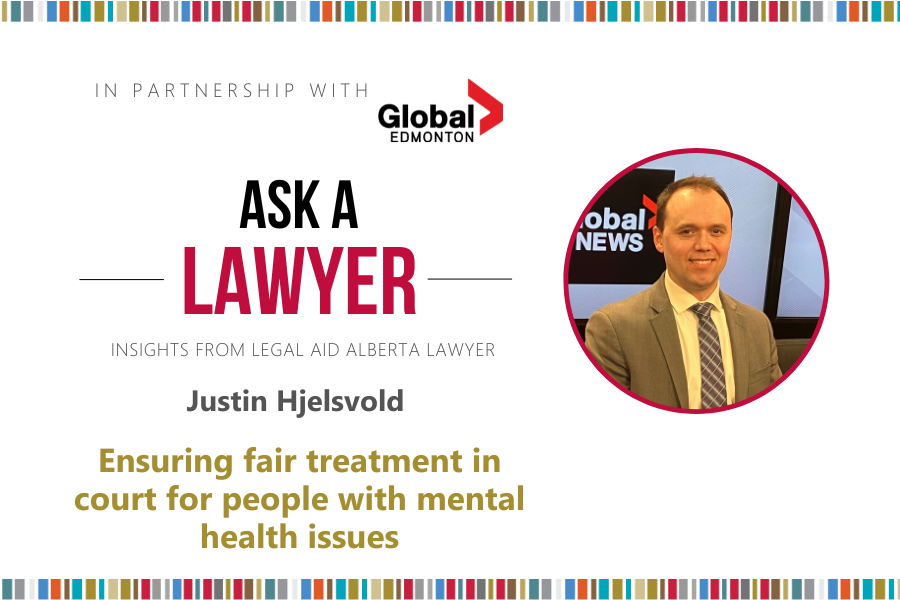Legal Aid Alberta staff lawyers have a key role in Edmonton’s Mental Health Court
Legal Aid Alberta staff lawyer Justin Hjelsvold’s role as duty counsel in courtrooms in and around Edmonton brings him into contact with people worried about the legal challenges they’re facing. Often, there’s more going on than criminal charges.
“Almost every day, I run into people who have some type of mental health condition,” he says.
Hjelsvold appeared on the May 7 segment of Ask A Lawyer, speaking with Global News anchor Vinesh Pratap about what happens when people with mental health issues come into contact with the courts, and how a unique Mental Health Court is making a difference.
Watch the Ask A Lawyer segment here:
Please view the video using the Microsoft Edge browser.
Transcript of the program:
Vinesh: Welcome back. This week marks Mental Health Week in Alberta, and it is a time to highlight the ongoing efforts to reduce the stigma around mental health and encourage conversations around treatment and support. Here to talk more about mental health and how it intersects with the criminal justice system is Legal Aid Alberta lawyer Justin Hjelsvold. Justin, good morning. Thanks so much for being here.
Justin: Good morning. Thanks for having me.
Vinesh: This is such an interesting topic because of issues that are obviously in the news headlines. So, first of all talk to us about your role with legal aid and how it relates to mental health.
Justin: I am a duty counsel lawyer and I work in criminal defence so I represent unrepresented people in criminal docket courts throughout Edmonton and the region. And almost every day I run into people who have some type of mental health condition and we do have a specialized court here in Edmonton called Edmonton Mental Health Court.
Vinesh: Expand upon that. How long has been around and how does it differ from the regular system?
Justin: It’s fairly new but it has been around for several years. It’s a specialized docket court so it exists to help people with issues of fitness for bail and for sentencing. When we talk about fitness we are trying to – we’re assessing a psychiatrist in their opinion and trying to figure out if this person can engage meaningfully with the court system and if they understand what is going on. There is also a team of mental health nurses and a justice navigator to connect people with resources in the community.
Vinesh: So talk to us but when determining if someone should access the court? it’s not black-and-white. Each circumstance is unique so take us through that and how to determine if a person is available or if a person is allowed to access the Mental Health Court.
Justin: The requirements of the court are that you, that there’s a reasonable basis to believe that they have a mental health condition and also a reasonable basis to believe that that condition had what’s called a nexus or a connection to the offence in question. So someone could have a very serious condition but if is not connected to what actually happened and they cannot access the court.
Vinesh: When someone is in the mental health court is the process different than the regular system? Take us through that. How does it unfold?
Justin: Well, it’s similar to a regular courtroom and the principles are the same but you have access to more information. So the person can give you consent to access their health records and you have a better sense of how they have reacted to treatment, counselling and so forth and the court can feel more comfortable knowing that if a person is connected with those resources that they will stabilize and be able to get back to a normal life.
Vinesh: And how does it impact the sentencing process if it gets to that point?
Justin: It can. Like in any court room there are two main things the court looks at so the first of which is the gravity of the offence so the facts and how serious it was, but the other thing is the particular circumstances of the offender. So someone with mental condition has a particular profile and being able to access that information allows the court to tailor the sentence better for that individual.
Vinesh: OK and finally, as you mentioned, the Mental Health Court is fairly new is it a live-and-learn process? Like is there something new to be learned and adjustments to be made as the court matures if you will?
Justin: Yes, and there’s regular meetings with the stakeholders where everyone comes together, and they have their ideas of how things can be approved. So, as it goes along it’s always getting better.
Vinesh: Definitely. Justin, thank you for coming and this is such a complex issue and hopefully this conversation can help lift the veil with what happens in the criminal justice system. Again, thank you for your time.
Vinesh: Legal Aid Alberta lawyers specialize in family law, child welfare, domestic violence, immigration and youth and adult criminal defence. If you do have a question for a lawyer send it over to [email protected] .


